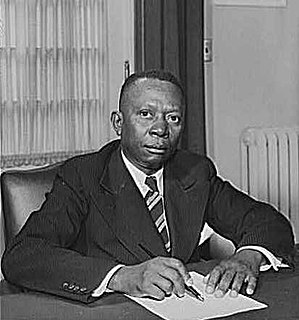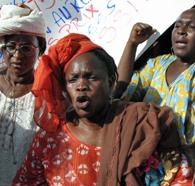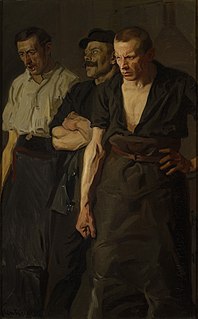
The International Confederation of Free Trade Unions (ICFTU) was an international trade union. It came into being on 7 December 1949 following a split within the World Federation of Trade Unions (WFTU), and was dissolved on 31 October 2006 when it merged with the World Confederation of Labour (WCL) to form the International Trade Union Confederation (ITUC).

The World Federation of Trade Unions (WFTU) was established in 1945 to replace the International Federation of Trade Unions. Its mission was to bring together trade unions across the world in a single international organization, much like the United Nations. After a number of Western trade unions left it in 1949, as a result of disputes over support for the Marshall Plan, to form the International Confederation of Free Trade Unions, the WFTU was made up primarily of unions affiliated with or sympathetic to communist parties. In the context of the Cold War, the WFTU was often portrayed as a Soviet front organization. A number of those unions, including those from Yugoslavia and China, left later when their governments had ideological differences with the Soviet Union.
Collective bargaining is a process of negotiation between employers and a group of employees aimed at agreements to regulate working salaries, working conditions, benefits, and other aspects of workers' compensation and rights for workers. The interests of the employees are commonly presented by representatives of a trade union to which the employees belong. The collective agreements reached by these negotiations usually set out wage scales, working hours, training, health and safety, overtime, grievance mechanisms, and rights to participate in workplace or company affairs.

William Vacanarat Shadrach Tubman was a Liberian politician. He was the 19th President of Liberia, serving from his election in 1944 until his death in 1971.
Histadrut or the General Organization of Workers in Israel originally is Israel's National trade union center, representing the majority of trade unionists in the State of Israel.
The Liberian Federation of Labor Unions (LFLU) is a national trade union center in Liberia. It was formed in 1980 by the merging of the United Workers' Congress and the Liberian Federation of Trade Unions.

Trade unionism is a powerful force in the politics, economy, and culture of Senegal, and was one of the earliest trades union movements to form in Francophone West Africa.

Anti-union violence is physical force intended to harm union officials, union organizers, union members, union sympathizers, or their families. It is most commonly used either during union organizing efforts, or during strikes. The aim most often is to prevent a union from forming, to destroy an existing union, or to reduce the effectiveness of a union or a particular strike action. If strikers prevent people or goods to enter or leave a workplace, violence may be used to allow people and goods to pass the picket line.
The Trade Unions of Albania was a mass organization of the Party of Labour of Albania during the socialist period which represented the interests of the working class in industry. Like other mass organizations it was a member of the Democratic Front.
The Confédération africaine des travailleurs croyants was a trade union confederation in French West Africa and Togo. C.A.T.C-A.O.F-Togo was founded in Ouagadougou July 8–15, 1956 by the West African branches of the French trade union centre C.F.T.C. David Soumah became the first president of C.A.T.C-A.O.F-Togo.
Confédération africaine des travailleurs croyants-Republique Centrafricain was a national trade union centre in the Central African Republic. The organization emerged from the Ubangi-Shari branch of the French trade union centre CFTC, which became the Ubangi-Shari affiliate of the Confédération africaine des travailleurs croyants in 1957. CATC was affiliated to the International Federation of Christian Trade Unions.
The Somali Confederation of Labour was a national trade union centre in Somalia. CSL was founded in 1949. CSL was closely linked to the ruling Somali Youth League, but retained organizational independence.
The Northern Rhodesian African Mineworkers' Union (A.M.U.) was a trade union in Northern Rhodesia which represented black African miners in the Copperbelt. The AMU was formed in 1949, and campaigned actively to improve working conditions and wages for African miners, as well as opposing racial discrimination in hiring. The union amalgamated with several other mining unions in 1967 to form the Mineworkers' Union of Zambia.
The labour movement or labor movement consists of two main wings, the trade union movement or labor union movement, also called trade unionism or labor unionism on the one hand, and the political labour movement on the other.
The Labor Congress of Liberia was a trade union centre in Liberia. It was one of the precursors of the Liberian Federation of Trade Unions (LFTU).
The United Workers Congress of Liberia was a trade union centre in Liberia.
The Liberian Federation of Trade Unions was a trade union centre in Liberia.
Amos N. Gray was a Liberian trade unionist. Born on 3 March 1933 in Pull River, Maryland County, Gray attended primary school in Pull River and secondary school in Harper. He attended college in Monrovia, studying social studies for two years and law for one year. During his college years he worked part-time at the Freeport of Monrovia. Working at the port in 1960, he joined the Maritime and Dock Workers Union. After his college years he worked at the Maritime and Dock Workers Union office in Monrovia.






